
Official Edgar Rice Burroughs Tribute and Weekly Webzine Site Since 1996 ~ Over 15,000 Web Pages in Archive Presents Volume 5813 |
 |

Official Edgar Rice Burroughs Tribute and Weekly Webzine Site Since 1996 ~ Over 15,000 Web Pages in Archive Presents Volume 5813 |
 |
Some Tarzan fans remember the original novels by Edgar Rice Burroughs, first published in 1914. Others will picture a grunting Johnny Weissmuller fighting lions in a loincloth in the dozen Tarzan adventures, originally made in the 1930s and ’40s, which played as TV reruns for years after. Ron Ely played him in a television series; Christopher Lambert was “Greystoke”; Disney animated him in 1999. |
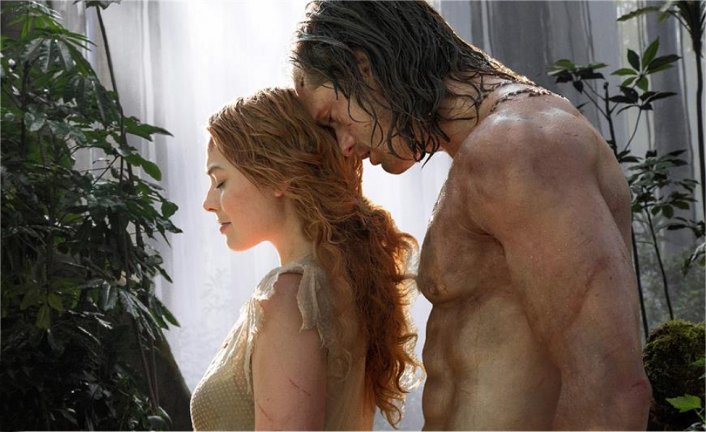
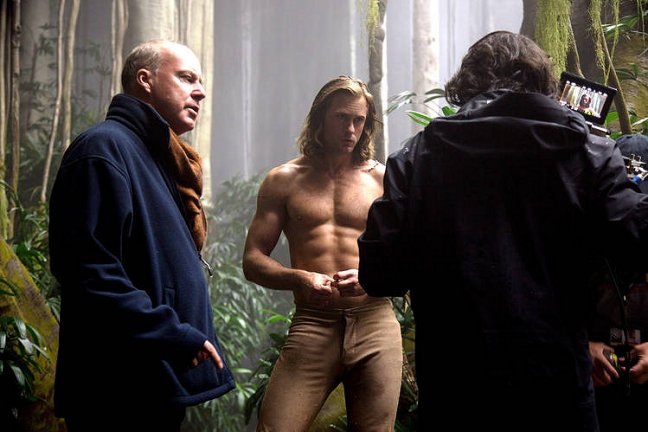
David Yates, left, and Alexander Skarsgard on the set of ‘The Legend
of Tarzan’
![]()
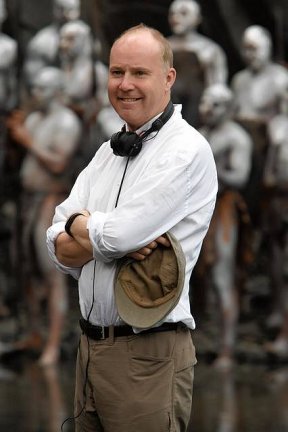
Director David Yates on the set of ‘The Legend of Tarzan’ |
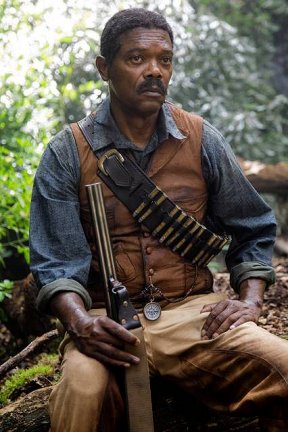
Samuel L. Jackson in ‘The Legend of Tarzan’ |
For those who have actually read the original "Tarzan of the Apes" by Edgar Rice Burroughs, the movie may have more in common with original story than implied by Ms. Feldman's review. The original setting of Tarzan saga seem at least partly consistent with the apparent theme of the film. In the original, Tarzan's father, John Clayton, Lord Greystroke, was sent to investigate the mistreatment of black British subjects in a West African Colony where they were being forced into virtual slavery by another colonial power. After Clayton's death Tarzan was raised by apes but grew to maturity embracing his civilized heritage as well as jungle life. The Hollywood movies of the "me Tarzan you Jane" genre are far removed from Burroughs's original account. The new movie may try to project some 21st century values on the historical setting. We'll see. However, if it moves the story closer to the original and quite sophisticated account as told by Burroughs, that will be a plus. 
A FEW EXCERPTED COMMENTS:
See the original article for more and for credits
Why not base a film such as this on the actual book? More hollywood numbness awashed with poitical correctness. Pass on the filim and read the book.
That is soooo right. I read the Tarzan books, and he's far more like Sean Connery as Bond in them than Weissmuller. I really thought then that Hollywood must have a lot of stupid people in it to reduce Tarzan to a B-movie character. They were sitting on a gold mine in the old days, but didn't have the sense to take advantage of it.
Being relevant and culturally resonant have always been the order of the day for movies.
Being "relevant" and politically correct are the order of the day in Hollywood and apparently sells films which is what it is all about. On the other hand I am old enough to remember seeing the Jonny Weissmuller films and today they would be dead in the water and not ever get a B rating.
You overlook the fact that the suppliers of the slave trade were Native Africans who raided neighboring tribes to secure captives to sell to the Arab middlemen for financial gain.
. . . stop confusing these small minded Lib/Progs with facts. It's all about the narrative, not the historical reality.
Have you even heard of Edgar Rice Burroughs? Try reading the books. I did when I was a kid. Must have missed the slavery angle. But Hollywood didn't. Hey one more time. White people are bad. White people are bad, white people are bad.....
What, exactly do you not like? Movies have always had preachy, politically correct components. Granted, the components evolve to reflect the culture but there is nothing different here.
Thanks for mentioning Johnny Weissmuller, the Tarzan of my parents' generation, and Ron, the Tarzan of mine. I have hopes that Alexander Skarsgard will become the Tarzan for this generation of film-goers and Margot Robbie will make Jane her own just as Maureen O'Sullivan had.
As a longtime fan of the Tarzan novels, with the exception of Sy Weintraub's productions, the Tarzan films never accurately represented the characters that Edgar Rice Burroughs created. This new production does albeit in an original take on the basic ERB premise. I look forward to how well David Yates achieves that goal.
As if slavery didn't exist in Africa before Europeans arrived. The Belgians were quite brutal in the Congo, but Arabs and other Africans enslaved far more Africans and treated them just as badly.

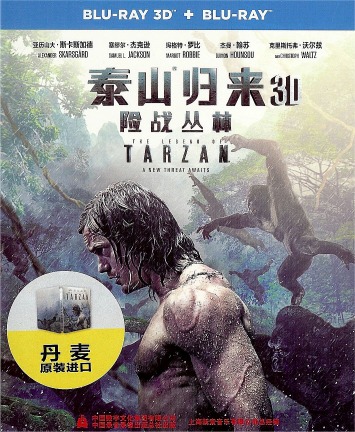
.
Skarsgård and Robbie Press Conference Interview
in China ~ Blu-Ray Release
https://www.youtube.com/watch?v=FjAKK6MmKek
![]()
See the various film trailers for “The Legend of Tarzan,”
starring Alexander Skarsgård, Margot Robbie
and Christoph Waltz.
Tarzan vs Akut: https://www.youtube.com/watch?v=3_IlA1j0af4
Scream for Me: https://www.youtube.com/watch?v=Tw6KV7CLnq4
You are Tarzan: https://www.youtube.com/watch?v=Lucbhu8vl5s
No Normal Man: https://www.youtube.com/watch?v=WEPwTPfi5bA
For information on all the ERB films from over the
last 100 years see:
www.ERBzine.com/movies
![]()
![]()

![]()
BILL
HILLMAN
Visit
our thousands of other sites at:
BILL
AND SUE-ON HILLMAN ECLECTIC STUDIO
ERB
Text, ERB Images and Tarzan® are ©Edgar Rice Burroughs, Inc.-
All Rights Reserved.
All
Original Work ©1996-2016/2018 by Bill Hillman and/or Contributing
Authors/Owners
No
part of this web site may be reproduced without permission from the respective
owners.